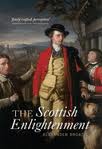Broadie, Alexander (2001/2007). The Scottish Enlightenment. Edinburgh: Berlinn Limited.
The importance of the European Enlightenment, from 1500 to 1800, can hardly be overestimated in Western history. During that period, there was a sea-change in thinking among intellectuals, away from the authority of the Christian church, to independent thinking based on reason and observation. The Enlightenment promised that living by reason, rather than authority, would improve human welfare, reform society and government, guarantee human rights, advance knowledge, reduce the need for war, and much else. Those promises have been kept to a significant degree, and today, evidence-based reasoning, in large part, defines “the modern mind.”
When I think of the Enlightenment, I think of the so-called “French” Enlightenment, and figures such as Voltaire, Diderot, Montesquieu, Descartes, Rousseau, Laplace, and many others. The Enlightenment was a comprehensive intellectual change, but in France, the emphasis was strongly anti-government and anti-church and maybe that’s why the whole movement is often referred to as the French Enlightenment.
Scotland participated in the overall European Enlightenment, contributing its own great thinkers, such as David Hume and Adam Smith. But according to author Broadie, there was a distinctive difference in Enlightenment thinking in Scotland, distinct enough be labeled “The Scottish Enlightenment.” He attempts in this book to explain what it means and how it arose.
The distinct characteristic of Scottish thinking at the time arose almost entirely from the mind of philosopher David Hume, supported by economist Adam Smith (“The Wealth of Nations”), and moral philosopher Adam Ferguson. Hume famously wrote, in his Treatise of Human Nature, “Reason is, and ought only to be, the slave of the passions, and can never pretend to any other office than to serve and obey them”
That contradicts the spirit of the French Enlightenment, which held that reason is necessary to tame the passions. Elevation of reason was the essence of the French Enlightenment. Yet here was Hume saying that reason can only serve the passions.
Hume argued that reason is just a tool of thinking and can never determine values. People can argue that the crops failed because of changed weather patterns, or because of God’s punishment. The basic assumptions of right and wrong, good and evil, virtue and vice, depend on human passions, not on reason. Reason can only be used to argue what is already believed through the passions.
That seems right at first, and does seem to contradict the French Enlightenment, a situation which caused me some concern. But after studying Broadie’s book, I can reject Hume’s idea. I will now use reason to explain why Hume was wrong and my passion is justified and correct. (Hume was a tricky guy!).
I spent over a decade browbeating college students about the benefits of using evidence-based reasoning, for their own good and for the good of humankind. I taught critical thinking, and the so-called “scientific method,” its gold standard; and I taught basic statistics, a wonderful abstraction of logical thinking and evidence-based reasoning. But after re-reading some Hume, it occurred to me that perhaps everything I was teaching was a lie! I turned to Broadie’s book for context. It helped me recover from my panic, and now I’m good again.
I think Hume’s error was his failure to discriminate between the context of discourse, and reasoning in general. It’s true that passionate reactions are instinctive, emotional, pre-conceptual and pre-logical. Reason plays little or no part in formation of our passions.
But when you conceptualize an idea for communication, reason and evidence are the most persuasive forms of rhetoric, and can change minds. It’s true, as Hume said, that reasoned arguments are formulated after the fact, to justify beliefs we already hold, but what he failed to note was that those reasoned arguments can be persuasive, causing a listener to change his or her beliefs. If that were not so, there would be no point in science, or even education, because nobody would ever budge from their initial biases. As it is though, many people are persuaded by evidence-based reasoning and can, and do modify their initial passionate beliefs because of it. Hume was therefore incorrect in saying that reason is only a slave to passion. It has another role, persuasion.
There is an important qualification: Reasoned argument is only persuasive to others within a community that already accepts certain fundamental biases (“passions”), such as the validity of logic, the value of observation, the usefulness of of analysis, belief that perception is generally veridical, faith in elementalism, individualism, particularism, materialism, consensus, and many other basic values. In other words, reasoned argument only works within a community of similarly socialized people. But in that context of discourse, higher-level passions, about government and education, for example, can be moderated.
Within an appropriate community, like a scientific community, a religious group, or a college classroom, reason can overcome overt passions, just as proponents of the French Enlightenment claimed. Minds can be changed; agreements can be reached. That is the whole point of valuing reason so highly. Reason is persuasive and highly effective in the right context. So I was not teaching my students lies, I simply was not giving them the full picture.
After reading Broadie’s book and giving it much thought, I am persuaded that the main themes of the Scottish Enlightenment were a unique contribution to European history, but perhaps not the direct challenge to the rest of the Enlightenment they are sometimes made out to be. Broadie’s excellent book had enough depth and breadth of facts and reasoning to let me come to a reasoned conclusion.

